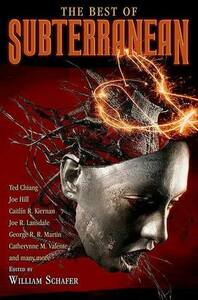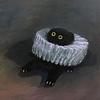Take a photo of a barcode or cover
Available here: https://web.archive.org/web/20140222103103/http://subterraneanpress.com/magazine/fall_2013/the_truth_of_fact_the_truth_of_feeling_by_ted_chiang
Interesting, I loved the premise of this story and the way the two narratives were reflected in each other.
Update:
When I first rated this (4 stars) I did so because there were some things bout the structure that I didn't like, but now the story has been percolating in my brain for six months and I realize it certainly deserves five stars. I have come back to it over and over again. I love what it means and how it gets to that meaning. I love how it has made me second guess my own memory and how it has made me rethink the technologies I use.
Wonderful story that I would recommend to everyone.
Update:
When I first rated this (4 stars) I did so because there were some things bout the structure that I didn't like, but now the story has been percolating in my brain for six months and I realize it certainly deserves five stars. I have come back to it over and over again. I love what it means and how it gets to that meaning. I love how it has made me second guess my own memory and how it has made me rethink the technologies I use.
Wonderful story that I would recommend to everyone.
Oh Ted Chiang. I love your brain and I love your words and I love this story.
Chiang tells two stories. One, a man reflecting on the introduction of technology that seeks to/threatens to/offers to replace/supplement human memory, and what that means for human interactions and human development. He also reflects on technology that means people don't actually write any more: they dictate. The stuff about memory, and how we use and change and develop from our memories, I found immensely powerful and fascinating. This is all illuminated via occasional insights into his relationship with his daughter.
The second story is about the experiences of the Tiv, in West Africa, and their interactions with white folk. This too brings discussion around ideas of memory - which are intimately bound up with writing, for white people - and ideas of what it is right to remember, and say.
I adored this story.
Chiang tells two stories. One, a man reflecting on the introduction of technology that seeks to/threatens to/offers to replace/supplement human memory, and what that means for human interactions and human development. He also reflects on technology that means people don't actually write any more: they dictate. The stuff about memory, and how we use and change and develop from our memories, I found immensely powerful and fascinating. This is all illuminated via occasional insights into his relationship with his daughter.
The second story is about the experiences of the Tiv, in West Africa, and their interactions with white folk. This too brings discussion around ideas of memory - which are intimately bound up with writing, for white people - and ideas of what it is right to remember, and say.
I adored this story.
I read this story because it was nominated for the Hugo Award. Alternating between the story of a future journalist researching an article about a new digital memory recovery aid and the story of an aboriginal tribe struggling with remembering the details of their lineage, Chiang presents two sides of the conundrum of memory. There is the truth of what’s right (in our imperfect minds), and there is the truth of what’s precise (as in a recording). There are circumstances where one is preferable to the other, as Chiang aptly demonstrates. This is a story that could only be told as science fiction, a story that uses a futuristic technology as the gateway to make you think about the human condition, in this case, the fallibility of memory and how it affects human relationships.
okay maybe a 3.5, i felt a bit hollow by the end but some of this is just so lovely and quotable so i am rounding up for now.
Ted Chiang should be a writer of Black Mirror!!! ANOTHER GREAT SHORT story by Ted Chiang. And excited to see the Story of Your Life Arrival.
Story dealing with the consequences of a new technology which allows one to record everything one sees and hears by creating a lifelog and then automatically search this log for events of the past. The author compares this invention with the invention of writing, since the latter allows one to record thoughts and facts and thus make them persist through time and across individuals. The former would also similarly allow one to record subjective experiences and make them persist through time, thus making the history of each person absolute. A fascinating and complex theme which is carefully conveyed through a simple juxtaposition.
adventurous
challenging
dark
emotional
mysterious
reflective
tense
fast-paced
Plot or Character Driven:
N/A
Strong character development:
N/A
Loveable characters:
Yes
Diverse cast of characters:
Yes
Flaws of characters a main focus:
Complicated
Absolutely incredible - my favorite book of the year. There is a story for everyone here.
Read for free online here:
https://subterraneanpress.com/magazine/fall_2013/the_truth_of_fact_the_truth_of_feeling_by_ted_chiang
https://subterraneanpress.com/magazine/fall_2013/the_truth_of_fact_the_truth_of_feeling_by_ted_chiang





